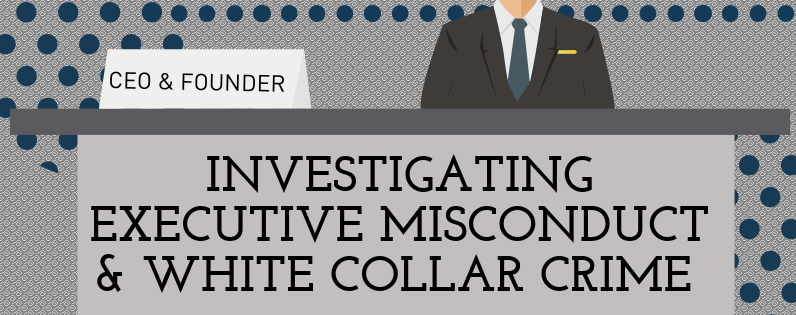
Find the Thief in Your Business with a Private Investigator

A private investigator can identify employee fraud and thief in your workforce, eliminating future threats while maintaining objectivity.
Despite the ability of a business to flourish in any economy, every company is still vulnerable to the possibility of employee theft or fraud. Like a frog in a boiling pot, sometimes companies can be taken by surprise when the theft has gradually grown over a period of time, and no one is the wiser until the business takes an unexpected financial hit. Companies can protect themselves from these frauds with costly in-house investigations into the crime, but a private investigator can go a long way towards identifying all perpetrators, no matter how high up the chain of command it goes.
Recent statistics from several government agencies who supervise finances and labor estimate theft committed annually by employees reaches an excess of $50 billion. Even an isolated incident can blanket a company in a crisis and leave them clawing out of the depths of bankruptcy. It starts with small things, such as taking office supplies for personal use. When this action goes unchecked, the employee might begin taking from petty cash without authorization. The level of the theft will always ratchet up the longer the thief goes undetected.
When an investigator attempts to identify employee fraud is knowing what to look for. Elliot Rysenbry of Trustify says there are six warning signs of employee theft for which Human Resources should be vigilant.
- Workaholics
- Behaviors of people who might be very dedicated to their jobs are also characteristic of people who might be stealing from your business. People who are always working long hours and never take a vacation. This “dedication” is a front for superiors. People who are stealing via their position do not want to be absent from the workplace for fear a temporary replacement might notice inconsistencies that could indicate fraud.
- Hyper-vigilance of connections
- When an employee has a close personal connection/relationship with any vendor or associated financial institution, it’s usually not cause for concern of impropriety. However, hyper-vigilance or strong protection of those relationships, it’s possible there’s something in the business arrangement for this employee. One of the most common names for this kind of fraudulent arrangement is “kickbacks” or getting a cut of the profits vendors or financial institutions receive from a thieving employee.
- Inflated expenses
- This is one of the most common types of theft committed in the workplace. Line items on expense reports are either inflated or fabricated entirely in order to pad the thief’s pocket.
- Extravagances
- Payroll knows what individual employees make week to week, so when there are unexplained extravagences in an employee’s life, such as a flashy new car, it’s important HR keep an eye on said employee.
- Frequent small transactions
- Taking from petty cash in small amounts can add up quickly, and is often a sign of more serious, larger-scale fraud being committed within the company.
- Entitlement
- Employees who feel as though they are underpaid or undervalued at their company are also plausible perpetrators of theft. Whether as a motive or a rationalization, they feel as if what they stole was deserved payment.
While theft can be an extremely toxic element in any work environment, one of the ways to exacerbate it is by conducting a poor internal investigation. Human Resource employees are unsung heroes of companies and businesses, as they are one of the crucial gatekeepers with control over the quality of employees. Not only are they very busy individuals, but they might not be the most objective persons to conduct an internal investigation.
Sometimes a lack of experience with investigations will cause a member of HR to make false or unprepared accusations about the guilt of a particular employee. If this employee is unimpeachable, the company can open itself up to lawsuits and bad press. Even if HR is not conducting the investigation, most employees are not trained investigators and might conduct an inquiry in an illegal manner that could also open the business up to litigation. Sometimes a pay cut for an employee suspected of stealing might seem like a quick and quiet way to resolve these issues, but legal counsel should always be consulted before making these decisions. By the same token, hasty termination of these employees to avoid a messy investigation should always involve the opinion of a legal expert—all in the name of protecting the country from plausible legal trouble.
The simple answer to avoiding all of the aforementioned ways to inflame an internal theft investigation is to retain the services of a private investigator. Private investigators can save companies from themselves in terms of opening themselves up to litigation or bad press. Private investigators have more skill and experience in these areas preventing investigations from blowing up in a negative manner. They are independent contractors, therefore, do not have a dog in the race when it comes to identifying the culprit of the theft. Their objectivity will be crucial, especially if the theft within the company goes all the way to the executive level. Because of their authority over employees, CEOs of companies might often get a soft front from HR or other investigative bodies within the business. Private investigators—being unknown to other employees in the business—can also conduct undercover operations to yield truthful and unbiased results. The private investigator, along with business counsel, can also advise Human Resource departments how to proceed once the culprit has been identified. Whatever the specific needs of a company, always consider hiring a private investigator to conduct internal investigations in order to protect and enhance the longevity of your business.
Identify employee fraud and theft today with Lauth Investigations International. Call 317-951-1100 or visit us online at our website for a free quote.

